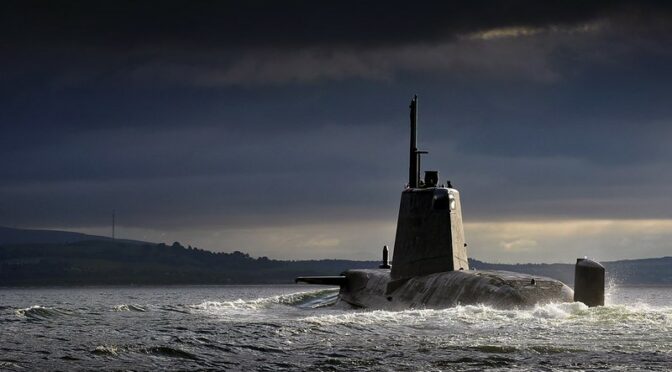Article published in The Daily Mail, 6 August 2024. © Richard Kemp
For a seafaring nation that once counted itself among the world’s great naval powers, the state of Britain’s submarine fleet is both an outrage and a humiliation.
It could also leave us open to catastrophic acts of sabotage by our enemies, with cables, pipelines and wind farms particularly vulnerable.
The global economy could not function without the 800,000 miles of undersea fibre-optic cabling criss-crossing the world’s oceans that are responsible for carrying 97 per cent of international communications and $10 trillion of financial transfers every day.
In a digital age, these cables have never been more essential and, if they were to be disabled, the world would be plunged into a devastating depression. As a report published by the Policy Exchange think-tank put it: ‘Short of nuclear or biological warfare, it is difficult to think of a threat that could be more justifiably described as existential than that posed by the catastrophic failure of undersea cable networks as a result of hostile action.’
It added: ‘In the words of the managing director of one major telecoms firm, “Cascading failures could immobilise much of the international telecommunications system and internet… The effect on international finance, military logistics, medicine, commerce and agriculture in a global economy would be profound … Electronic funds transfers, credit card transactions and international bank reconciliations would slow…such an event would cause a global depression.”’
Such an outcome is all too possible given how vulnerable these cables are. While they are engineered to the ‘five nines’ standard – meaning they are reliable 99.999 per cent of the time – they are highly vulnerable to attacks by enemy forces.
Typically just over an inch in diameter, they consist of fibre optics – strands of glass as thin as a hair – in the centre, surrounded by galvanised steel wire armouring and then, on the outside, a plastic coating.
Russian submersibles, armed with hydraulic cutters, would make short work of the hosepipe-thin cables. Alternatively, divers or remotely operated vehicles (ROVs) with cutters fitted to their hulls could do the job.
In shallower waters, more primitive methods could be used. A vessel could deliberately drag an anchor along the seabed to rip the cables apart. Such an attack could be covered up by passing it off as an innocent fishing boat accident.
In such a context, having a fully functioning fleet capable of patrolling vast tracts of ocean is a must.
Protecting this vast seabed infrastructure is a key role for the Astute class of submarines, which are specifically designed to hunt down enemy vessels.
After all, Russia – which is making increasingly bold incursions into waters around Western nations – has one of the largest submarine fleets in the world with an estimated 58 vessels.
And the protection of undersea cables is not our submarine fleet’s only function, of course.
We rely on them for much else besides, including gathering intelligence and taking special forces teams on covert missions. But, at a time when Russia’s war against Ukraine threatens to spill over into neighbouring countries, the Middle East is like a tinder box, and a Chinese invasion of Taiwan could be launched at any moment, our Armed Forces are in a parlous state – and none more so than our navy.
No political administration emerges well from this hopeless state of affairs, although it is true that the last Conservative government promised a significant increase in defence spending.
The new Labour Government has made no such promise – it’s time it did.
Image: Defence Imagery/Flickr

